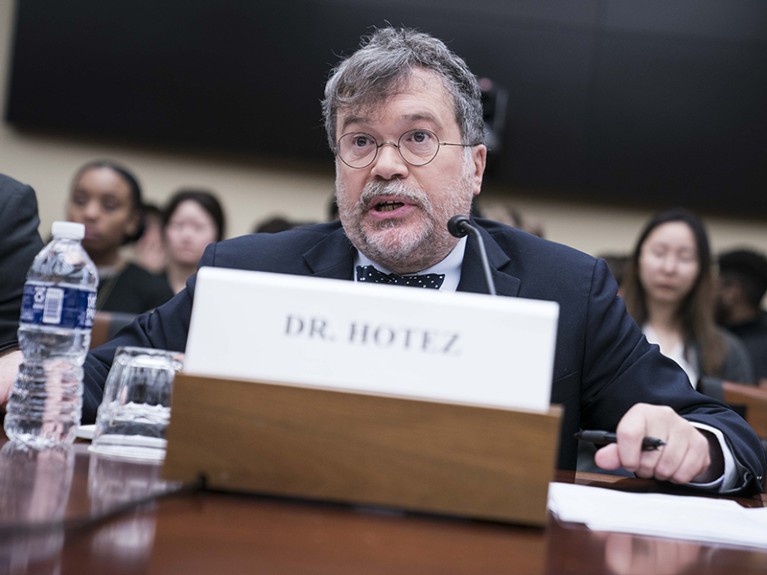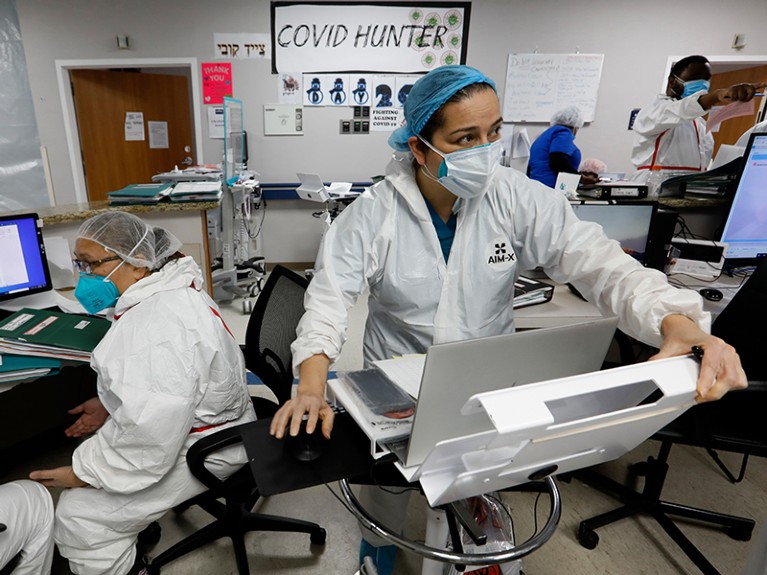the health strategist
institute for strategic health transformation
& digital technology
Joaquim Cardoso MSc.
Chief Research and Strategy Officer (CRSO),
Chief Editor and Senior Advisor
October 3, 2023

What is the message?
The article published by Nature discusses how scientists, including vaccine specialist Peter Hotez, are facing increasing aggression and harassment due to their efforts to combat anti-science misinformation, particularly related to COVID-19 and vaccines.
Hotez emphasizes that the anti-science aggression is not random misinformation but an organized, politically motivated campaign that threatens the fabric of science.
He highlights the need for scientists and leaders to speak out against these attacks and calls for political solutions to address the problem, as well as the creation of organizations to protect biomedical scientists from organized threats.
Ultimately, scientists are urged to understand that they are under attack for political reasons and to continue their noble work despite the challenges.
DEEP DIVE

Vaccine specialist Peter Hotez: scientists are ‘under attack for someone else’s political gain’
The physician-researcher who spoke out against misinformation during the COVID-19 pandemic says attacks against science are formidable — and getting worse.
Nature
Julian Nowogrodzki
September 21, 2023
The Deadly Rise of Anti-Science: A Scientist’s Warning Peter Hotez Johns Hopkins Univ. Press (2023)

For his work developing low-cost COVID-19 vaccines, Peter Hotez was nominated for the 2022 Nobel Peace Prize. But for speaking out against anti-vaccine misinformation, he has become a prominent target of harassment, receiving death threats and having stalkers appear at his home on Father’s Day.
Nature spoke to the physician-scientist — who is dean of the School of Tropical Medicine at Baylor College of Medicine in Houston, Texas, and chair of Tropical Pediatrics at Texas Children’s Hospital — about his book The Deadly Rise of Anti-science. He also discusses why he finds the current crop of well-funded anti-science aggression concerning and how researchers and others must combat it.
You prefer to say ‘anti-science aggression’ rather than ‘misinformation’. Why?
Misinformation makes it sound like it’s random junk that appears out of nowhere on the Internet. It’s not: it’s an organized, well-financed, politically motivated campaign that’s meant to tear down the fabric of science. And we have to frame it in that way.
Anti-science rhetoric is not new. What’s changed?
Now, it’s fully embraced by a major political party in the United States, and by authoritarian regimes in other countries such as Hungary and, previously, Brazil. It’s sanctioned by elected leaders in the US Congress. It’s reached a new level of organization and aggression — it’s starting to resemble the 1930s, when Joseph Stalin’s regime in the Soviet Union portrayed scientists as enemies of the state.
The point of the book is to draw a line in the sand and say, ‘No, this must stop.’
How did you see this play out during the COVID-19 pandemic?
Some 200,000 Americans died because of anti-science aggression. They were victims of this coordinated campaign. That’s why we need to care about it. It’s horrifying. I want to honour the legacy of those victims.COVID scientists in the public eye need protection from threats
When I went into the more conservative, rural areas of east Texas, essentially everyone I talked to had lost a loved one because they refused a COVID-19 vaccine. In the intensive-care unit, you saw some people deny COVID-19 existed, yet in their dying words feel remorse and advise their friends: ‘Don’t do what I did, get your COVID-19 immunization.’ These are good people. [Anti-science campaigners] took advantage of that.
How did speaking out during the pandemic affect you?
I was able to make a difference by helping to lead a team of scientists who developed vaccines that reached 100 million people in India and Indonesia [CORBEVAX and IndoVac]. So, it didn’t prevent me from doing what scientists do, which is to write scientific papers and go to laboratory meetings and advance our work.
But there’s no question that I’ve been leading this dual life, having to combat aggression against science and scientists. It’s hit me hard because now I’m a major target of far-right extremists. It’s odd to have [former White House strategist] Steve Bannon call you a criminal on social media. Those [statements] act as dog whistles, and then it’s followed by a wave of threats online and by e-mail, and even physical stalking.
Right now, you’re seeing individual scientists getting picked off by anti-science bullies on the Internet, or getting subpoenaed to testify at show-trial-like hearings. It’s terrible to watch my virology colleagues get paraded on [television network] CSpan as though they’ve done something wrong, when all they did was what I do — science for humanitarian purposes.
And I see the aggression getting worse as we head for the 2024 election.
So how can this be stopped?
This is the hardest question to answer. People in the health sector don’t know what to do; scientific societies discuss it in bland, defeatist language and talk about meeting with social-media companies. But no one seems to be willing to say, as I do, that this is political. As scientists, we are trained to have neutrality, we’re not supposed to talk about Republicans and Democrats or liberals and conservatives. But what do we do when the attacks are partisan?
We’re not seeing vigorous pushback or response, and neutrality favours the tormentor or the aggressor. We’re not hearing from the leadership of scientific societies, from university presidents, to defend science. I think they don’t want to offend donors coming from that political side, or state legislatures or the federal government. But they need to speak out in a forthright way. That’s what you do when you have a vampire: if you don’t have a silver bullet or a stake, you shine a light on it.

But ultimately, the answer is not going to come from the scientific community alone. We need help.
This has become a political problem that will require political solutions. We’re going to need to have the leadership of the White House and the US Congress saying no, science and technology are fundamental to the stature and importance of the United States as a nation and we’re not going to tolerate these attacks.
What can researchers do?
It’s hard to do this on an individual level. One of the hardest things about going up against anti-science aggression is feeling like you’re alone in this, especially if scientists don’t have the backing of their employers. That’s scary. I think we have to change that, make scientists feel comfortable speaking out. Otherwise it creates a vacuum, and that’s where the anti-science activists win.COVID vaccines: time to confront anti-vax aggression
What I’m starting to do now is talk with my colleagues about creating something like the Southern Poverty Law Center or like the Climate Science Defense Fund, for protecting biomedical scientists. We need a new type of organization , which I sometimes call the American Biomedical Scientists Defense Alliance, to counter these organized threats against science.
What’s your advice for dealing with online trolls?
In general, I agree not to feed the trolls. The vast majority I simply block. Sometimes I’ll try to use this to help people understand the nature of anti-science aggression. I’m not doing it for the original commenter, but for the benefit of the scientific community, so they understand the nature of the threats.
Have you changed anyone’s mind?
Not often, but every now and then, when I point out that they’ve been misled by an organized machinery. Sometimes they’re thoughtful, and sometimes they’ll even apologize, but that’s rare.
In your book’s dedication, you thank police departments and hospital security forces for keeping your family safe. How do you deal with fear?
I love Marie Curie’s quote: “Nothing in life is to be feared, it is only to be understood.” Reading about the history of attacks on science in the twentieth century and speaking with journalists and political scientists has helped me to understand that there is political motivation. The right-wing media need to keep stoking the faux outrage machine, which is how they monetize the Internet. They couldn’t care less about me; it’s what I represent.
What’s your message to scientists?
Understand that science and scientists are under threat, and it’s a coordinated campaign. What you’re doing as a scientist is noble. Scientists should feel good about what they do. By reading my book, you shouldn’t be demoralized. Understand that it’s not you who’s doing something wrong: you’re under attack for someone else’s political gain. Even though it’s scary, I think there’s some comfort in that.
Originally published at https://www.nature.com








